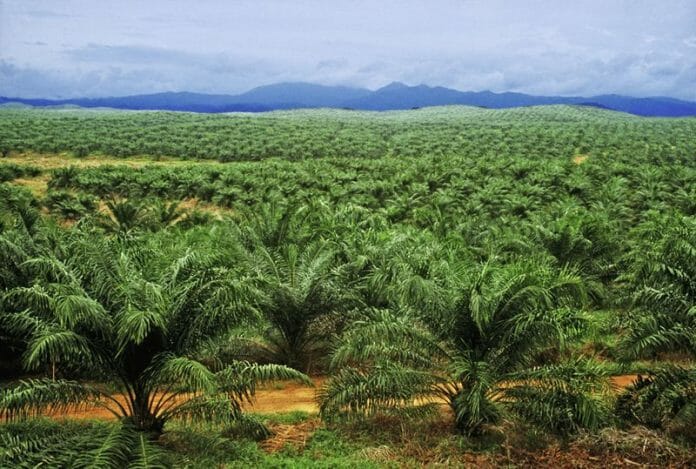By Eur Ing Hong Wai Onn
Palm oil, a versatile resource used in diverse products such as food, cosmetics, and biofuels, holds immense appeal for growers and smallholders in tropical regions. Global palm oil production has surged from 24 million tonnes in 2000/2001 to 77 million tonnes in 2022/2023, meeting the soaring demand for vegetable oils. In the face of sustainability challenges, climate action imperatives, and economic growth aspirations, exploring how cutting-edge technologies redefine decision-making, foster global partnerships, and steer the palm oil industry toward efficiency, greener operations, and enhanced transparency becomes crucial.
From Precision Farming to Smart Plantations
The advent of precision farming technologies signals a transformative era in palm oil cultivation. Drones equipped with advanced sensors reshape field monitoring, empowering farmers to assess crop health, detect diseases, and optimize resource allocation with unparalleled precision. This targeted approach reduces reliance on extensive pesticides, optimizing resource use and minimizing the environmental footprint, resulting in a more sustainable and eco-friendly palm oil production process.
Concurrently, smart plantations utilize geospatial technology to collect data on oil palm plantations, soil types, agro-climatic conditions, and suitable cultivation areas. Fueled by data analytics, these systems ensure efficient water resource utilization and fertilizer application, enhancing sustainability and resilience to climate change. Some major players in the palm oil industry are exploring robotics to address labor shortages in crop harvesting, aiming to increase oil palm yields without expanding land usage.
Blockchain and Supply Chain Transparency
Transparency and accountability challenges in the palm oil industry find a transformative solution in blockchain technology. Providing an immutable and transparent ledger for the entire supply chain, blockchain enables consumers to trace palm oil products from cultivation to distribution, verifying their sustainability credentials. This transparency aligns with consumer expectations and empowers producers committed to responsible practices. Blockchain also contributes to supply chain trust, safeguards working conditions, and provides valuable data on crop harvesting for plantations. Through geolocation features, stakeholders can manage digital inventories, track land concessions, and implement sustainable land usage planning policies. Integrated sensor technology helps minimize spoilage by monitoring processing, storage, and transport conditions on a unified platform.
While some argue this emerging technology is reserved for industry giants, the Dayak Oil Palm Planters Association (DOPPA) in Sarawak, Malaysia, proves otherwise. The association seeks inclusion in global palm oil trade, preventing exclusion of its indigenous Dayak farmer members due to European Union import restrictions.
AI-Driven Decision-Making for Sustainable Operations
Cutting-edge technologies offer remarkable opportunities in the palm oil industry, facilitating the collection and in-depth analysis of extensive data. The integration of the Internet of Things and sensors provides farmers with real-time information on crucial aspects such as soil health, climate conditions, and crop status, empowering informed decisions about plantation operations and supply chain management, all while considering environmental impact.
Moreover, the advent of Artificial Intelligence (AI) signifies a transformative leap in decision-making processes within the palm oil industry. AI algorithms, capable of analyzing vast datasets, optimize various aspects, including planting and fertilizer schedules, predicting harvest yields, and streamlining logistics. This not only enhances operational efficiency but also addresses environmental concerns by minimizing resource waste and energy consumption. Importantly, the positive impact of these technological advancements extends beyond the industry itself, contributing to broader goals of sustainability and global food security.
Global Collaboration through Digital Platforms
While digital platforms are commonplace in various industries, their integration is still in its nascent phase within the palm oil sector. These platforms have the potential to cultivate unprecedented collaboration among stakeholders throughout the palm oil value chain, facilitating the exchange of knowledge, best practices, and innovations. By overcoming geographical barriers, these collaborations extend beyond borders, establishing a global network dedicated to advancing sustainable practices in the palm oil industry.
Simultaneously, digital platforms can leverage satellite-based remote sensing technologies to offer a comprehensive view of palm oil plantations. This includes efficient monitoring of deforestation, changes in land use, and compliance with sustainability standards. Through this enhanced oversight, stakeholders can ensure the implementation of responsible land management practices and address deforestation concerns, fostering a more sustainable and environmentally conscious palm oil industry. Looking ahead, it is imaginable that a consumer in the United States could swiftly determine the source of palm oil in margarine and track the carbon emissions from the palm oil estate to the supermarket shelf through an open-source digital platform or application.
Shaping a Sustainable Future
In conclusion, the palm oil industry is undergoing a transformative phase driven by cutting-edge technologies. Precision farming and smart plantations, enabled by drones and advanced sensors, redefine palm oil production for eco-friendly and sustainable practices. Blockchain ensures transparency and accountability, meeting consumer expectations and empowering responsible producers. AI-driven decision-making optimizes efficiency and addresses environmental concerns, contributing to broader sustainability and food security goals. Emerging digital platforms foster collaboration, creating a global network dedicated to advancing sustainable practices. Leveraging satellite-based technologies efficiently monitors and addresses environmental concerns, promoting a more responsible palm oil industry. The harmonious integration of these technologies propels the sector toward a future marked by efficiency, greener operations, and enhanced transparency, aligning with sustainability, climate action, and economic growth imperatives.
The author is a chartered chemical engineer and a Fellow of the Institution of Chemical Engineers and the Royal Society of Chemistry. He is also the author of “A Chemical Engineer in the Palm Oil Milling Industry”









